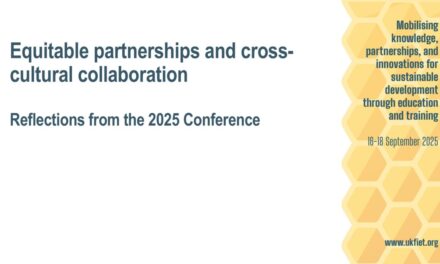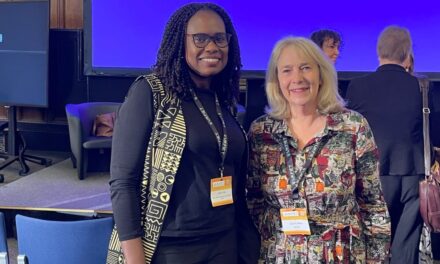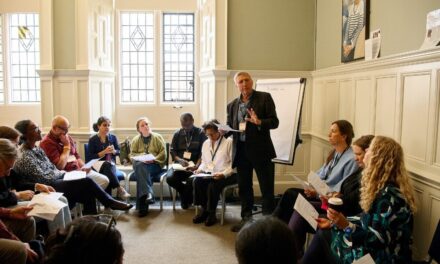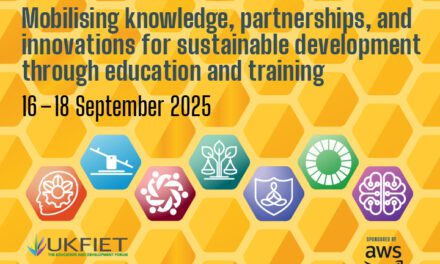This blog was written after the UKFIET September 2025 conference by the theme convenors of ‘Learner safety and wellbeing’, one of seven conference themes: Danielle Cornish-Spencer, Social Development Direct and Juliet Millican, Institute of Development Studies
The 2025 UKFIET Conference on ‘Mobilising Knowledge partnerships for Sustainable Development’, included a new theme this year, on Learner Safety and Wellbeing. However, the conference opened with a keynote from Ahmad Kamal Junina, live from Gaza city, talking about how he could be displaced at any moment, suggesting anything other than a context of safety. He described the dangers teachers face on a daily basis, in order to continue their work. As Associate Professor in linguistics, Professor Junina talked about the fragility of education under occupation and how the policy of scholasticide is applied to continually undermine attempts to document the onslaught and protect learners. He reminded us that without connectivity and safety there is no academic freedom, and as he spoke, evacuation orders were already in place for him and his family. He called for sustained partnerships, scholarships and programmes to help affirm the right to learn as an act of hope.
Yussef Sayed, Professorial Chair of Global Education, Policy and Equity at Cambridge University followed up his introduction, citing ongoing conflicts in Sudan, Yemen and Congo as examples of state violence and a stark reminder of the rise of authoritarianism in other parts of the world. He quoted Gramsci saying ‘Disruptive and Dangerous Dialogue offer hope for the future’, asking whose knowledge are we mobilising and how can we use that knowledge in resistance. Both Junina and Sayed used their brief platforms to talk about ‘ a field in crisis’ – literally and in policy terms – with the humanitarian and education sectors desperately under threat. Sayed’s take on the approaching polycrisis sees authoritarianism as a response to dwindling resources caused by climate breakdown, violence as a response to authoritarianism and multilateralism and any united world order as a casualty of both.
Both saw education as a way of moving beyond barbarism and partnerships as a way of transcending nationalist agendas, but, in the midst of conflict, how do educators find the resilience to continue, what kinds of partnerships help, and how do we keep learners safe amidst the scale of the aggressions we are witnessing?
Many of the presentations offered within the theme of Learner Safety at the conference sought to respond to these questions, also drawing attention to incidents of internal, inter-personal violence, which exist alongside state and large-scale conflicts with normalised and everyday patterns of inequality and harm. 90 million children alive today have experienced sexual violence, hugely impacting their learning, while teachers, many of whom will also have experienced or witnessed small or large scale violence, are often unequipped to deal with trauma in others. We know that victims often grow up to become perpetrators, that is more evident now than ever, and breaking cycles of violence is essential in private and public spheres.
Oksana Zabolotna from War Child Ukraine spoke about how education is central to survival and resilience in Ukraine, offering children a stability and a suggestion of a ‘way out’ to a better future while living among large scale violence. As a university professor, as well as a practitioner, she reminded us that partnerships can bridge the gaps between different geographical locations, as well as between theory and practice, contributing to research-informed real-world responses in conflict settings.
Cyril Brandt from the Institute of Development Studies considered teacher preparation in relation to pre-service education in conflict settings, with specific reference to a project in the Democratic Republic of Congo, where Peace Education, Education in Emergencies, Trauma Sensitive approaches and Conflict Resolution techniques were piloted as part of the curriculum in three teacher training colleges. With increasing aid cuts, teachers are frontline responders in many crisis and conflict settings, and embedding this into government-funded and existing structures may be crucial to minimise violence. While Brandt drew on examples of innovative responses in other countries the approach appears to be under evaluated and deserves more attention in the future.
Many conference submissions this year were on the theme of Social and Emotional Learning – seen as essential for wellbeing, belonging and inclusion, while at the same time highlighting how this cannot function in isolation but relies on foundational safeguarding, trust and protection mechanisms. Gabby MacKeith from University College London shared her work on ‘Empowered to Empower” a study on how enhanced female teachers’ agency and confidence, produced positive ripple effects for learners. This was partly due to LINK Education’s safeguarding system in Ethiopia that went beyond compliance — embedding multi-sectoral, socio-ecological and preventative measures that made emotional learning meaningful.
Madeeha Ansari from ‘Cities for Children’ focused on individually-perpetuated intergenerational violence in education, showing how teachers’ disciplinary practices often mirror their own experiences of corporal punishment in a study in rural India, that showed 71% reporting such experiences. Esinam Ami Avornyo’s Ghanaian study also showed how teachers’ instructional beliefs (direct vs. active learning) directly influenced their approach to discipline. To truly prevent violence in schools, systems must address teachers’ wellbeing, reflective practice, and professional learning, not only compliance.
Decolonising or localising also emerged as a theme. Ashmeet Kaur from TERI School of Advanced Studies’, looked at peace education through decolonial praxis in rural India, which embodied a shift from control to care, from punitive discipline to relational attachment. By valuing local pedagogies, smaller class settings, and teacher–learner connection, it challenges colonial legacies of discipline and positions love, belonging, and mutual respect as the foundation for safety and learning.
However, Hannah Hoechner’s research on the Boko Haram insurgency in Northern Nigeria, presented as part of the same session, illustrated how attempts to reject Western education as not including a moral perspective (Boko Haram translates as ‘Western education is bad’) were behind the fundamentalist uprisings in the area, the kidnapping of girls and the fear and conflict instilled in the region as a result.
Many lessons can be drawn from these diverse presentations; education can be a lifeline, but educational institutions are also a target and can be an unsafe space for groups and individuals, safe learning environments are built through relationships of care — between teachers, learners, systems and communities. Cycles of violence perpetuate themselves as victims learn violence, and can harbour and reproduce it, again as individuals or as states, tribes or communities.
Violence prevention and response, Social and Emotional Learning, decolonised pedagogy that recognises the dual socialisation process that many in former colonial countries have experienced, knowledge sharing and knowledge partnerships are all part of an ecosystem of learning. But like any system, it is complex, with different parts impacting the whole. Constant vigilance is required to ensure one element of the partnership does not undermine what other parts of the system are aiming to achieve. Whether that partner is a funder, a stakeholder, a participant or an instructor, they all contribute to a whole. To break a cycle of violence, strategies of care, safety, resilience and resistance are all needed to avoid adding to individual or collective trauma and distress.
No single intervention can dismantle intergenerational cycles of violence but the different presentations at this year’s UKFIET conference drew attention to some of the excellent work that is being done in this area. As educators, managers, researchers and practitioners, we must continue to share our work and remain vigilant to the resistance we can face, from the small oversights and compromises we may make on a daily basis, to the historic systems of oppression and dispossession enforced by those who benefit from the continuity of conflict. Conferences like these serve to remind us of the importance of that vigilance and of our ongoing work.




